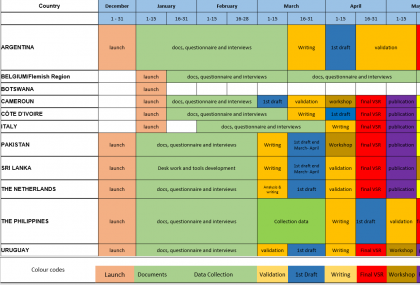
Following the successful experiences from previous years, UCLG and CIB have kicked-off another Voluntary Subnational Review (VSR) trajectory. This year, the following 10 Local Government Associations (LGA) will prepare a VSR: Sri Lanka, Pakistan, The Philippines, Cameroun, Botswana, Côte-d’Ivoire, Italy, The Netherlands, Argentina and Uruguay. The VVSG (Flanders, Belgium) is also connected, as they will present a VSR in 2023. Representatives from these 11 LGAs participated in the first workshop which took place on the 8th of February. A great start for this new VSR community!
VSR workshops
UCLG and CIB are not only coaching and supporting the 10 LGAs in the process of developing VSRs; we also make a strong effort to bring the LGAs together, to enhance mutual knowledge exchange and learning. This happens through the organization of VSR workshops, as well as through email threads and other online tools. This first workshop took place on the 8th of February. Getting to know each other and hearing about each other's planning and methodology stood central in this first meeting.
VSRs as empirical prove
Emilia Sáiz, Secretary General of UCLG, opened the workshop, mentioning that "UCLG considers VSRs as very important building blocks, a milestone of the work that we are doing in localization. And localization of the global Agendas for UCLG, for our constituency, is more than the simple implementation for the Agendas, it’s actually influencing the agendas and demonstrating the role that LRGs need to play in shaping the world, in transforming it. The Voluntary Subnational Reviews play a very critical role in this as well because it allows us to actually empirically prove what we are doing, what we are achieving, what we mean and how we can relate to the national process that is taking place but also to the local process that we are busy with.".
Ms Sáiz also explained what participating in the development of VSRs in previous years has led to : "It has allowed associations to start a new type of dialogue with the national government and if they had that dialogue they have been able to actually enstrengthen. It has provided new spaces for structural conversations but it has also influenced the way the VNRs are presented and how they portray the implementation at local levels, it’s what we call a bottom-up influence."
Planning and methodology
The presentations of the 10 LGAs that followed after the opening, showed that all LGAs have kicked-off their VSR process and are in the process of disseminating a survey to (a selection/sample of) their members, some are already in the process of interviewing and/or collecting good practices. All LGAs are will combine quantitative and qualitative data, which will be analysed in the months of March and April. Draft reports will be published right after, leading to final VSRs before the UN's High Level Political Forum on the SDG's between 5-15 July. The workshop provided LGAs with the opportunity to exchange on challenges (incl. time constraints) and similarities.
Two more UCLG-CIB workshops
UCLG and CIB will organize two more LGA workshops in the next months, bringing together the hard-working technicians of LGAs. We will make sure to make the next workshops even more interactive; we are looking into options for break-out sessions etc. In the meantime, CIB stands ready to coach the LGAs from Cameroon, Sri Lanka and the Philippines. The GOLD team will support the other associations.
Quick reminder: what are VSRs?
Voluntary Subnational Reviews (VSRs) are SDG reports developed by associations of local and/or regional governments. They are country-wide, bottom-up subnational reporting processes that provide both comprehensive and in-depth analyses of the corresponding national environments in which subnational governments localize the SDGs, showcase the subnational progress in achieving the Goals, and provide policy recommendations to help subnational governments achieve the SDGs sooner. Besides this, VSRs are a podium to share the experiences of LRGs from different parts of each country in implementing the SDGs on the ground.
